Curious about how much is a cow in Nigeria? As of March 2025, the price of a cow in Nigeria ranges from ₦400,000 to ₦2,500,000, depending on factors like size, breed, location, and market conditions. Cows are a vital part of Nigeria’s culture and economy, whether for meat, dairy, or ceremonies. We’re here to provide a detailed, engaging guide with current pricing, key influences, and practical tips to help you navigate Nigeria’s lively livestock market. Let’s dive into the specifics.
Table of Contents
ToggleWhy Cows Matter in Nigeria
Cows are more than livestock in Nigeria—they’re a backbone of agriculture, a source of income for northern herders, and a staple for celebrations like weddings and Eid. Breeds like White Fulani and Sokoto Gudali are prized for their meat and milk, while demand spikes during festive seasons. With economic shifts and regional challenges, cow prices reflect both tradition and modern pressures. We’ll explore what you’re paying for and why costs vary.
Current Cow Prices in Nigeria
Let’s break down the costs. Prices for a live cow in Nigeria depend on size, breed, and where you buy. Here’s the latest as of March 2025, drawn from market trends:
Price by Size and Type
- Small Cow/Calf (under 200 kg): ₦400,000 to ₦600,000—ideal for rearing or small events.
- Medium Cow (200-350 kg): ₦700,000 to ₦1,200,000—common for household use or mid-sized gatherings.
- Large Cow (350-500 kg): ₦1,300,000 to ₦2,000,000—popular for big ceremonies or meat sellers.
- Premium Breeds (e.g., Sokoto Gudali, 500+ kg): ₦2,000,000 to ₦2,500,000—top-tier for yield and quality.
Regional Price Variations
- Northern Markets (e.g., Kano, Maiduguri): ₦400,000 to ₦1,500,000—cheaper due to proximity to cattle-rearing zones.
- Southern Markets (e.g., Lagos, Abuja): ₦800,000 to ₦2,500,000—higher from transport and demand.
Read also Current Price of a Carton of Turkey in Nigeria
Where to Buy a Cow in Nigeria
Nigeria’s cattle markets are bustling hubs:
- Kano and Maiduguri: Northern hotspots with lower prices and abundant supply.
- Kara Market (Lagos): Near Lagos-Ibadan Expressway, pricier but accessible for southerners.
- Abuja Livestock Market: Caters to urban demand, often ₦1,000,000+.
- Online Platforms: Jiji.ng lists cows from ₦500,000, with delivery options.
Physical markets let you inspect the cow—vital to avoid duds. We suggest trusted sellers to dodge scams.
What Affects Cow Prices?
Several factors drive the cost of a cow in Nigeria:
- Breed: White Fulani (milk/meat) or Red Bororo (meat) fetch higher prices than smaller Muturu.
- Size/Weight: More meat means more money—500 kg cows top the scale.
- Location: Northern rural areas beat urban south in affordability.
- Season: Festive periods like Eid or Christmas spike prices by 20-50%.
- Economy: Naira devaluation and fuel costs inflate transport and feed expenses.
These dynamics keep prices fluid, so timing matters.
Popular Cow Breeds in Nigeria
Here’s a quick look at common breeds:
- White Fulani (Bunaji): Long horns, dual-purpose (milk/meat), hardy in heat.
- Sokoto Gudali: Large, meat-rich, a premium pick.
- Red Bororo: Reddish, meat-focused, favored by Fulanis.
- Muturu: Small, fast-growing, budget-friendly.
Each breed suits different needs—meat, milk, or both.
Nigeria vs. Global Cow Prices
Globally, a cow might cost $1,000-$2,000 (₦1,580,000-₦3,160,000), but Nigeria’s range of ₦400,000 to ₦2,500,000 reflects local supply and import reliance. In Kenya, a medium cow is around KSh 50,000 (₦275,000)—cheaper due to less transport overhead. Nigeria’s prices hold firm despite economic pressures.
Tips for Buying a Cow on a Budget
Save smart with these steps:
- Compare Markets: Northern deals beat southern rates—check Jiji.ng or local hubs.
- Haggle Hard: Negotiate at markets like Kara for ₦50,000+ off.
- Buy Off-Season: Avoid festive rushes for 10-30% savings.
- Inspect Health: Look for bright eyes, steady gait—sick cows cost more later.
Read Also How Much Is a Standing AC in Nigeria? 2025 guide
Cost Beyond the Purchase
Owning a cow isn’t just the upfront price:
- Transport: ₦50,000-₦150,000 from north to south.
- Feed: ₦5,000-₦20,000/month, depending on grazing access.
- Vet Care: ₦10,000-₦30,000/year for checkups.
Factor these in to avoid surprises.
Is a Cow Worth the Price?
For meat, milk, or ceremonies, yes—if it fits your needs. A ₦1,000,000 cow can yield 200-300 kg of beef (worth ₦900,000-₦1,350,000 at ₦4,500/kg), offsetting costs for sellers or families. It’s a big spend, but the value shines in bulk use or resale.
Final Take on Cow Costs
So, how much is a cow in Nigeria? From ₦400,000 for a calf to ₦2,500,000 for a premium beast, it’s a range shaped by size, breed, and market. Nigeria’s cattle trade offers options for all—north or south, online or in-person. With this guide, you’re ready to buy smart and get the most bang for your Naira. Will you snag one now or wait for a dip?


